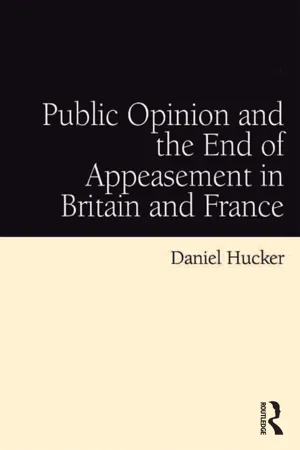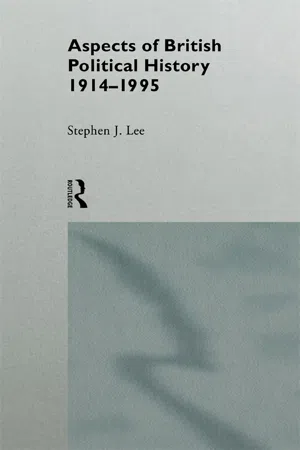History
Appeasement
Appeasement refers to the diplomatic strategy of making concessions to an aggressive power in order to avoid conflict. It gained prominence in the 1930s as European powers sought to appease Nazi Germany's expansionist ambitions. The policy is often criticized for failing to prevent World War II and allowing Hitler to strengthen his position.
Written by Perlego with AI-assistance
Related key terms
5 Key excerpts on "Appeasement"
- Daniel Hucker(Author)
- 2016(Publication Date)
- Routledge(Publisher)
For the purpose of this study, Appeasement will be defined by its commonalities and by its contemporary meaning. That is, despite different conceptions of Appeasement in Britain and France (bearing in mind that the term itself was rarely, if ever, used in 1930s France), its overriding objective was the same: avoiding war by altering the Versailles system to accommodate peacefully the grievances of the revisionist powers. Moreover, although the motivations for pursuing such a policy were diverse and often country-specific, one commonality between the British and French case studies was the imperative of avoiding war. Indeed, it is this imperative that features most prominently in an analysis of public opinion. For the general public in 1938–39, Appeasement meant the avoidance of war, but also (and increasingly) the abdication of power, prestige and honour. In essence, ‘Appeasement’ was the ‘Munich policy’, a term used widely on both sides of the Channel. Hence it is this interpretation of Appeasement that will be used throughout this study.Whatever one’s chosen definition, the very word ‘Appeasement’ resonates with meaning. Largely negative and ignominiously symbolic, it retains a ‘mythic status as a foreign policy of catastrophic failure’, evoking the infamous Munich agreement and Chamberlain’s notorious claim of ‘peace in our time’.7 Within the discourse of contemporary international relations, Munich remains a dirty word, synonymous with diplomatic weakness, self-delusion and failure.8 Little has changed since the early days of the war, when the fervent backlash against the appeasers was first articulated. The 1940 publication, Guilty Men , castigated the British governments of the 1930s for capitulating to a dictatorial megalomaniac intent on world war. Munich is described thus: ‘Mr Chamberlain sighed with satisfaction when this distasteful scheme had, by the united efforts of himself and the French premier, been crammed down the reluctant gullet of the Czech rulers.’9 1940 also saw the publication of Cecil Melville’s Guilty Frenchmen , condemning the ‘consciously’ and ‘unconsciously’ guilty statesmen of the Third Republic.10 Three years later, the French journalist André Géraud, writing under his better-known pseudonym of ‘Pertinax’, published Les Fossoyeurs , the gravediggers in question being the French premier at the time of Munich, Édouard Daladier, the military leader Général Maurice Gamelin, the premier at the time of the 1940 defeat, Paul Reynaud, and the iconic face of the Vichy regime, Philippe Pétain.11- eBook - ePub
Politics and Strategy
Partisan Ambition and American Statecraft
- Peter Trubowitz(Author)
- 2011(Publication Date)
- Princeton University Press(Publisher)
and domestic incentives. What differentiates appeasers (satisficers) from balancers or expansionists are the parameters of choice—the combination of international and domestic incentives that shape strategic choice. As I show in the next chapter, when those incentives change, so too does the type of strategy leaders prefer.1 Indeed, one of the main criticisms of Appeasement is that such concessions only whet the adversary’s appetite for additional concessions. See, for example, Mearsheimer (2001).2 Buckpassing and bandwagoning are other responses that cross-pressured leaders sometimes favor. In the case studies, I explain why Appeasement was preferred to buckpassing and bandwagoning.3 In all three cases, the U.S. faced multiple threats. I focus here on the primary challenger.4 See, for example, Flexner (1974); F. McDonald (1974); Ellis (2004); Harper (2004); and Henriques (2006). Some historians view Washington’s strategy as neutrality rather than Appeasement. However, given the many concessions Washington made to Britain at France’s expense, Appeasement seems more apposite. In any event, the difference is not essential for my argument. Appeasement and neutrality are both inexpensive status quo strategies that cross-pressured leaders may turn to when they have little geopolitical slack, and military expansion does not pay domestically.5 On the general history of the Jay Treaty, see Bemis (1962) and Coombs (1970).6 To many Americans, this was but the latest in a series of high-handed British economic policies since the 1783 Treaty of Paris that had given America its independence. London continued to occupy many frontier posts in U.S. territory in violation of the terms of the 1783 treaty. The British army used those posts to funnel arms from Canada to Indian tribes to slow the advance of American settlers and protect British fur-trading interests in the region.7 - eBook - ePub
- Stephen J. Lee(Author)
- 2005(Publication Date)
- Routledge(Publisher)
10 FOREIGN POLICY AND Appeasement 1933–9
The politicians most directly associated with Appeasement were the three prime ministers of the 1930s: Ramsay MacDonald (1929–35), Stanley Baldwin (1935–7) and Neville Chamberlain (1937–40), along with their Foreign Secretaries: Sir John Simon (1931–5), Sir Samuel Hoare (1935), and Lord Halifax (1938–40).This chapter will consider the origins of Appeasement as deliberate policy and its applications over Italy, Spain and Germany. The main emphasis will be on detailed examination of the controversial policy of Chamberlain between the Munich settlement of September 1938 and the declaration of war on Germany twelve months later.THE ORIGINS OF Appeasement
It is tempting to think of Appeasement as a policy which originated in the 1930s as a response to the military threat posed by the dictatorships, and as a replacement for the earlier ‘stand firm’ policy embodied in collective security. This end-on chronological view of collective security and Appeasement is, however, simplistic. There was, rather, an overlap between the two. Collective security had never, for Britain, been a total commitment and there had always been reservations and loopholes which might be seen as incipient Appeasement. These reservations rapidly increased during the 1930s. Appeasement did not, therefore, suddenly appear as an alternative to collective security. It coexisted with collective security, grew out of it and eventually replaced it.But it had little direct impact on the actual formation of that policy. This was due more to the structural defects of collective security and theThere had always been an undercurrent of Appeasement in Britain, stemming from the First World War, during which the Union of Democratic Control (UDC) had been established. Comprising a number of MPs and others from the Labour and Liberal parties, this played some part in preparing the British public to accept the policy of Appeasement. - eBook - ePub
When Things Go Wrong
Foreign Policy Decision Making under Adverse Feedback
- Charles F. Hermann(Author)
- 2012(Publication Date)
- Routledge(Publisher)
Diplomacy of Illusion. London: Weidenfeld & Nicolson. Mommsen, Wolfgang and Lothar Kettenaker, eds. 1983. The Fascist Challenge and the Policy of Appeasement. London: George Allen & Unwin.Newman, William J. 1968. The Balance of Power in the Interwar Years. New York: Random House.Nye, Joseph. 1987. “Nuclear Learning and U.S. Security Regimes.” International Organization 41(3): 371–402.Parker, Robert Alexander Clarke. 1993. Chamberlain and Appeasement. London: The Macmillan Press, Ltd.Parliamentary Debates 1937–1943. House of Commons Official Reports. London: H.M.S.O. Post, Gaines. 1992. Dilemmas of Appeasement. Ithaca, NY: Cornell.Robbins, Keith. 1997. Appeasement, 2nd edn. Oxford, UK: Blackwell.Rock, Stephen R. 2000. Appeasement in International Politics. Lexington: University Press of Kentucky.Rock, William R. 1977. British Appeasement in the 1930s. New York: W.W. Norton. Rokeach, Milton. 1960. The Open and Closed Mind. New York: Basic Books.Rokeach, Milton. 1968. Beliefs, Attitudes, and Values. San Francisco, CA: Jossey-Bass. Schafer, Mark and Stephen G. Walker. 2006a. Beliefs and Leadership in World Politics. New York: Palgrave-Macmillan.Schafer, Mark and Stephen G. Walker. 2006b. “Democratic Leaders and the Democratic Peace: The Operational Codes of Tony Blair and Bill Clinton.” International Studies Quarterly 50(3): 561–584.Schweller, Randall. 1998. Deadly Imbalances. New York: Columbia University Press.Schweller, Randall. 2001. “The Twenty Years’ Crisis: Why a Concert Didn’t Arise.” In Bridges and Boundaries: Historians, Political Scientists, and the Study of International Relations, ed. Colin Elman and Miriam Elman. Cambridge, MA: MIT Press, 181–212.Taylor, Alan John Percivale. 1961. The Origins of the Second World War. New York: Athenaeum.Tetlock, Philip. 1991. “In Search of an Elusive Concept.” In Learning in U.S. and Soviet Foreign Policy, ed. George Breslauer and Philip Tetlock. Boulder: Westview Press, 20–61.Tetlock, Philip. 1998. “Social Psychology and World Politics.” In Handbook of Social Psychology - eBook - ePub
- Gordon Martel(Author)
- 2002(Publication Date)
- Routledge(Publisher)
To do so is difficult not merely because British attitudes and actions were, in Taylor’s book, integrated into the overall story of why the Second World War occurred but because our own judgments of how well-founded, say, were Whitehall’s worries about the size of the Luftwaffe will be affected by new researches on German aerial rearmament. Similarly, our assessments of British policy towards Poland, Russia and the USA in the 1930s can be placed in a different light by newly released archival materials from those countries, as well as from France, Japan and other actors. Above all, the issue of how well, or how poorly, the British understood Hitler’s real intentions can be fully analyzed only by reference to scholarship on German policy, which is outside the bounds of this particular essay. 4 Students wishing to comprehend British Appeasement will always need to understand other, non-British, perspectives as well. The enormous literature on “the meaning of Appeasement” 5 can be dealt with briefly here, since its significance for our purposes lies chiefly in the way Taylor’s revisionist work challenged a well-established orthodoxy. Although Appeasement originally was a positive concept – as in the “appeasing” of one’s appetite – the failure of Neville Chamberlain’s policies turned it into a pejorative term by 1939, a tendency which grew ever stronger as the costs of the war mounted and the full horrors of Nazi policy were gradually revealed. Since Hitler was by then regarded as the Devil incarnate, it followed that Chamberlain and Daladier’s diplomacy in the late 1930s had been hopelessly misconceived and morally wrong. 6 Instead of standing up to the führer’s manic ambitions, they had weakly appeased them. Taylor’s revisionism assaulted this orthodoxy on both the intellectual and the moral front. In his view, the restoration of Germany as a leading power, if not the leading power, in Europe was natural and inevitable
Learn about this page
Index pages curate the most relevant extracts from our library of academic textbooks. They’ve been created using an in-house natural language model (NLM), each adding context and meaning to key research topics.




